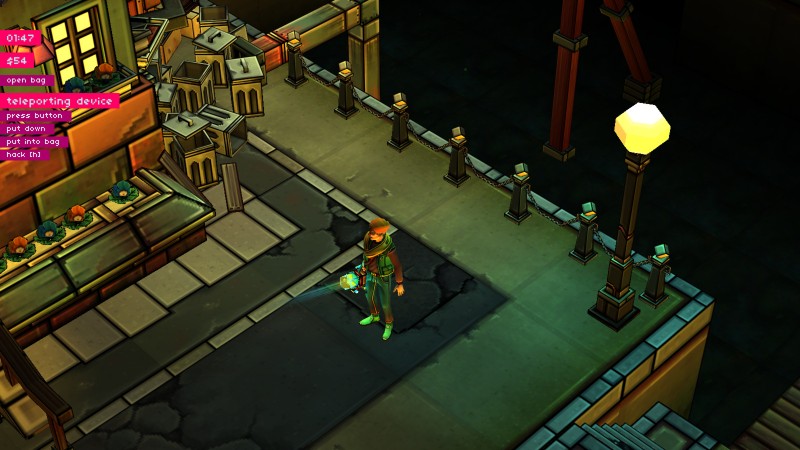The title of Else Heart.Break() keeps it’s conditionals hidden. If what else heartbreak? Suffice to say that so far the condition stil holds: I love this game and it seems to love me back and nobody needs to get hurt.
If you’ve read anything about Heartbreak it’s probably about the code. Most things – from cigarettes to mainframes – can be hacked. This is true but that’s not a fit description of the game. Else Heart.Break() accomplishes that rare thing of making me feel like I inhabit the character I’m controlling. At the outset I felt lost and disoriented in a bizarre world that seemed as ill prepared for me as I for it. A couple of hours in I feel like a bona-fide, bad-ass cyber-noir detective. Allow me to explain.
I say detective rather than programmer because code is a game mechanic, not the central issue in the game or the game itself. I loved Spacechem for being a programming puzzle with a (very good) story tacked onto it but this is not it. Code is one amongst a number of mechanics which work excellently together in creating a sense of atmosphere and involvement in the story and the game world. You are a detective in the sense that the true imperative in the game – as much as there is one, you can just loaf about and enjoy the scenery – is figuring out ‘what is going on’. And I throw in the noir bit, not for the atmosphere which is unrelentingly cheery, but because the series of clues you follow is clearly there to guide you, not because it makes sense for them to be there. Why does one thing happen after another in The Big Sleep? To progress the story of course and draw the protagonists and viewers deeper into it’s underworld, not because it makes sense for them to happen.
The brilliant thing about the way Else let’s you detectiveer (detectivate? detectioneer?) is that it presents an open world full of people with their own agendas and then let’s you go. You explore the physical world alongside the networked and understanding one is inextricably linked to understanding the other – and both contribute to telling the story you are trying to unravel. What this means is that the code never feels like that most dreaded thing of all, a minigame. Else tells it story by way of people, city planning, stray notes – and code – in the same way that Gone Home tells it’s story by way of letters and tapes and the like. That doesn’t mean that every piece of code is meaningful – the text-based satnav program PedestrianOS seems to be omnipresent on computers throughout the city mainly to help you get around – but you do learn a lot about Dorisburg, the setting of Else, by reading the code embedded in its many objects. Of course what the presence of code in stuff also accomplishes is establishing a sense of Matrix-style conspiracy and paranoia, even in the seemingly chill & cheery Bohemia that is Dorisburg.
Note that I’ve used the noun ‘code’ thoughout this piece rather than the activity ‘coding’. You find code, you read code and you work on understanding code. You do also manipulate code but writing programs from scratch has not really been central to anything I’ve done so far. Which is a good thing. If I wanted to write programs I would be writing programs, not playing a video game. What Else makes you do is use your existing coding skills (or teaches you some basic ones) in order for you to tease out the plot and progress it with a few alterations or inputs. As I said, detectivationeer… detective work.
And it’s a perfect match because Else makes you feel skilled and knowledgeable in uncovering it’s plot, it’s world and it’s mechanics. Most dedicated detective games, aka Sherlock Simulators, simply make me feel like a fraud who clicks on stuff (aka ‘clues’) and mashes inventory things together in the vain hope of ‘making a connection’. In Else code is the method in the madness. You know what you’re doing and when you don’t it’s an experiment rather than a desparate plea for something random to happen. It’s trial and error rather than click and pray. In true noir style you rarely know why you’re doing it. Why do I want to go into the hotel’s basement? Why am I not just going home seeing as I’ve been fired? Why am I pursuing a random girl who doesn’t seem particularly interesting – or interested in me? Why am I connecting to the mysterious ministry’s central server. To some this may be a minus or at least a gaping hole in the story. To me – as I have said – it just felt noir. Logic doesn’t apply. You just get sucked in.
In an open world game you explore the world because exploration is exciting. Your exploration of the code works in a similar way. Figuring out what you can and cannot do is exciting. Else Heart.Break() combines the two and the result has drawn me in faster than you can type Slurp().

